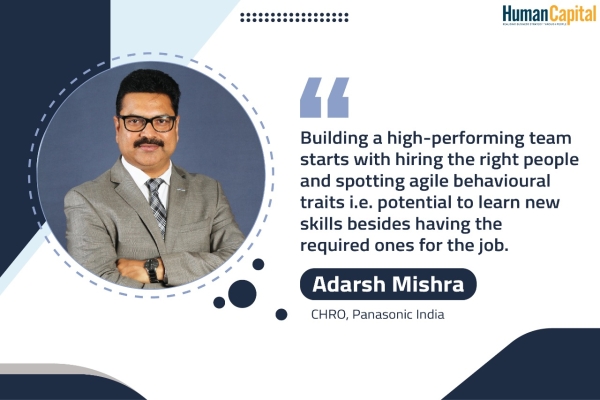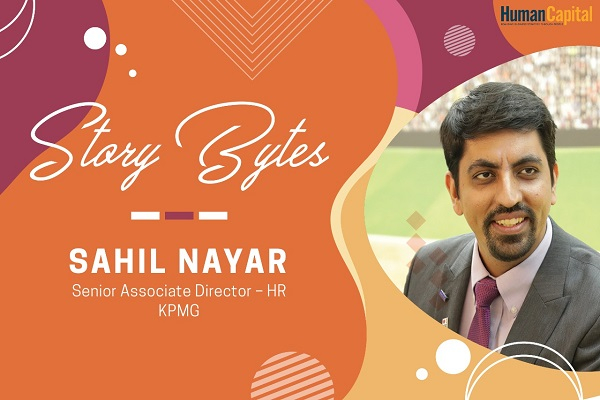“The only thing constant in the world is change” - Heraclitus
Today, we are probably witnessing the fastest evolution in the history of human race. There is a paradigm shift in our workplace and homes, and, how business is transacted. Digital is shrinking the world, minimizing physical distances. In order to stay relevant, and, make best of the transformations around, one needs to continuously adapt to change.
In the context of organisational change, it assumes even greater significance as the sustainability of the organisation might depend on its ability to adapt to change. It is common knowledge that organisations are a sum total of its people and their knowledge. Therefore, it becomes increasingly important to ensure that organisational changes are handled with utmost care and empathy. History has it that most changes have been for the better, and, it has been an eternal struggle for mankind to adapt to change. And, uncertainty with the unknown is probably the single most factor which often leads to resistance to change. The uncertainty is further amplified in the context of organisations, where changes can have significant impact on careers and roles of individuals. In a country like ours, where the concept of redundancy due to change is still nascent, the journey towards eternal change and adaptation is largely difficult. This is where organisations have a role to play in terms of building a culture of change over a period of time to ensure continuity, smoother transition, and business success.
Some of the better known corporate brands in existence for a long time have invariably evolved, changed strategies, and, even moved into newer opportunities from time to time to stay relevant, and also to be in business. On the other hand, corporate history is littered with instances of unicorns leading to either market marginalisation or cessation of business (E.g. RIM, Kodak). Such case studies are real business lessons and irrefutable justification for embracing change, and, living with it to stay afloat and relevant.\
Human Capital as change agents
One of the co-pilots of cultural shift in an organisation is the Human Capital function. It is a vital and an extremely critical cog for the organisation’s success. It acts as the sponsor of change and the champion of capability development. While the business leaders set the direction, the Human Capability function are the enablers of building the skill repository relevant for the changing organisation.
In Quotes “One of the co-pilots of cultural shift in an organisation is the Human Capital function. It is a vital and an extremely critical cog for the organisation’s success. It acts as the sponsor of change and the champion of capability development.”
The function is also crucial for its ability to educate the teams about the changes, and, its impact. While they are not mandated to spread awareness, they must be wilful partners in advocating change. This necessitates that HR be open to change and even consider an agile methodology. HR teams will be required to demonstrate the willingness to experiment newer approaches which are destined to fail. This would build a commitment to explore newer opportunities, and, help dispel apprehensions among the work force, and, guide them to an environment of certainty.
Influence – the crucial art of consultative approach
HR plays the role of influencing business strategy besides people strategy. HR, as a function, therefore needs to have a deeper understanding of the business, and, the ability to advice business leaders on strategic business and people priorities, making room for a holistic consultative approach to business consulting.
What is equally important is apart from intra-organisational understanding of the business, an intra-industry understanding at macro and micro levels is also essential. HR must therefore be aware of the trends and patterns emerging among the change elements of the business, abet the organisation, so that the business leaders to have an “outside in” view of the business including the emerging opportunities. HR function can therefore be in a position to advise leaders on a wide range of matters ranging from business to people and learning strategy. Even more crucial would be the advisory on ideas around talent – whether to buy or build – in reference to the business evolution.
Change journey
HR should utilize the opportunity of being the change agents. Managing change often leads to discomfort, and, it becomes extremely crucial that the journey is handled very well for everyone within the organisation.
Communicate, communicate, communicate
The biggest problem in communication is the communication illusion, and, it is quintessential for HR to not fall in this trap, and ensure effective, frequent and relevant communication. And, this is the differentiator between success and failure. It is pertinent that communication is done well in advance, is palatable and is done gradually.
For a successful business change, leaders and the HR function must take the lead, and start the process of communication at the soonest. Leaders must ensure that even half the information be shared all through to avert grapevine, and, thus retain the confidence the employees have with the leadership.
The other impact is the increased insecurity that comes with such changes, and, hence increases the risk of resistance. Communication need not be only through emails, but can be done in the form of townhalls, employee connect sessions and many more. The bottom line is communication and open channels for addressing queries and concerns.
Building future capability
While it is now an established norm that businesses will evolve and change courses rapidly, sometimes, even in completely uncharted waters, it helps tremendously when organisations keep capability building at the forefront of its growth agenda. This means that we do not consider capability building at the last moment when changes are imminent, but keep it as a gradual process, so that when the actual change happens employees have relevant skills to help them in picking up new roles within or outside the organisation. For this to succeed, leaders and the HR team needs to assiduously work towards creating awareness of the changing nature of business, and, how it affects people and then trigger the urgency to learn continuously.
Build a culture of learning agility
Building a culture of learning agility goes a long way in ensuring that change happens in a more consistent manner with lesser organisational friction. This culture building starts right from the top, where the consistent message must be on the importance of learning new skills on an ongoing basis. Learning new skills should be a norm rather than an exception. Employees need to realize that the days of fixed education culminating in employment are long gone, and, learning newer skills as they evolve will keep them employed. Of course, this has to be in line with the employee’s interest and curiosity, but learning is a must. Hiring “Future ready” talent that ensures a common set of competencies among individuals primarily around learning agility, curiosity, the ability to work with diverse teams and the ability to collaborate.
When organisations refer to the employer brand, it is actually a combination of these characteristics that make the brand an attractive proposition to the potential employees. This is vital in the 21st century as the expectation of a workplace from a millennial is very different from past generations, and, these skills will continue to be of attraction to the next generation of employees for some time to come.
In Quotes “The expectation of a workplace from a millennial is very different from past generations, and these skills will continue to be of attraction to the next generation of employees for some time to come.”
Is your organisation post-COVID-ready?
Trending
-
SBI General Insurance Launches Digital Health Campaign
-
CredR Rolls Out 'Life Happens' Leave For Its Employees
-
Meesho Announces 30-Week Gender-Neutral Parental Leave Policy
-
Microsoft Unveils Tech Resilience Curriculum To Foster An Inclusive Future
-
60% Indian Professionals Looking For Job Change Due To COVID: Survey
-
SpringPeople And Siemens Collaborate For Digital Transformation Push
-
86% Professionals Believe Hybrid Work Is Essential For Work Life Balance: Report
-
Almost 1 In Every 3 People's Personal Life Affected Due To Work Stress
-
Meesho Rolls Out Reset And Recharge Policy For Employees
-
80% Of Talent Leaders & Academics Say Pandemic Changed Skill Needs For Youth: Report
-
Hero Electric Rolls Out 'Hero Care' Program For Employees
-
Human Capital In Collaboration With ASSOCHAM Hosts Virtual Conference
-
IKEA India, Tata STRIVE Collaborate To Create Employability And Entrepreneurship Opportunities
-
SAP India, Microsoft Launch Tech Skilling Program for Young Women
-
DXC Technology, NASSCOM Collaborate For Employability Skills Program
-
Lenskart To Hire Over 2000 Employees Across India By 2022
-
Mindtree Launches Learn-and-Earn Program
-
Tata AIA Extends 'Raksha Ka Teeka' To Its Employees
-
Swadesh Behera Is The New CPO Of Titan
-
NetConnect Global Plans To Recruit 5000 Tech Professionals In India
-
Hubhopper Plans To Hire 60% Of Indian Podcasters By 2022
-
Corporate India Needs More Women In Leadership Roles: Report
-
Aon to Invest $30 Million and Create 10,000 Apprenticeships by 2030
-
Tech Mahindra Launches ‘Gift a Career’ Initiative for Upskilling of Youth
-
40% Women Prefer Flexible Working Options in Post-COVID World: Survey
-
3 out of 4 companies believe they can effectively hire employees virtually: Report
-
Vodafone , CGI and NASSCOM Foundation launch digital skills platform
-
Odisha: Bank, postal employees to deliver cash for elderly, differently-abled persons
-
Skill India launches AI-based digital platform for "Skilled Workforce"
-
Hiring activity declines 6.73% in first quarter: Survey
-
70% startups impacted by COVID-19 pandemic
-
Bajaj Allianz Life ropes in Santanu Banerjee as CHRO
-
Over 70 Percent MSMEs look at cutting jobs to sustain businesses
-
93 Per Cent employees stressed about returning to office post-lockdown
-
Johnson & Johnson India announces family benefits for same gender partners
-
Indian firms turning friendly towards working mothers
-
Welspun India names Rajendra Mehta as new CHRO
-
Wipro partners with NASSCOM to launch Future Skills platform



Human Capital is niche media organisation for HR and Corporate. Our aim is to create an outstanding user experience for all our clients, readers, employers and employees through inspiring, industry-leading content pieces in the form of case studies, analysis, expert reports, authored articles and blogs. We cover topics such as talent acquisition, learning and development, diversity and inclusion, leadership, compensation, recruitment and many more.
Subscribe Now












































Comment